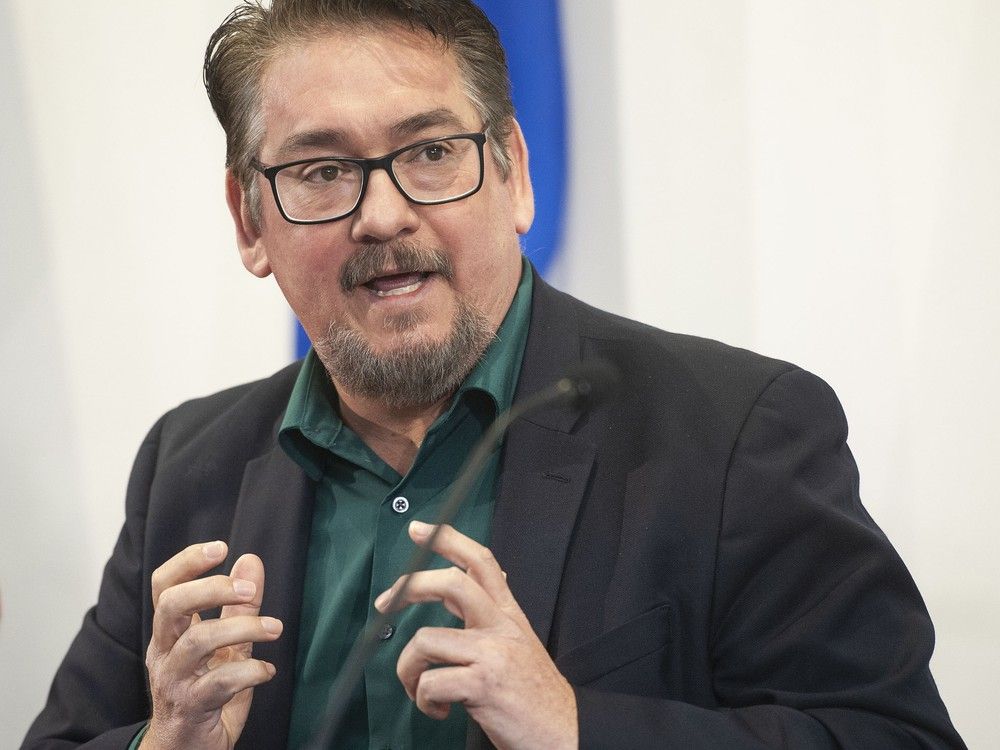
Premier David Eby gave First Nations leaders no indications Thursday that he plans to back down on his government’s controversial legislation to give his cabinet wide-ranging powers to approve infrastructure and certain clean-energy projects.
Emerging from a virtual meeting with the premier, members of the First Nations Leadership Council said they’re already looking at the “legal ramifications” and preparing for the possibility of court battles challenging Bill 14, the Renewable Energy Projects (Streamlined Permitting) Act and Bill 15, the Infrastructure Projects Act.
Indigenous leaders have vehemently opposed the two pieces of legislation in the weeks since their introduction, decrying the lack of consultation with First Nations and the potential negative impacts on their land and communities.
“The premier is backing himself into a situation that potentially could be very explosive,” said Robert Phillips of the First Nations Summit Political Executive. “We do believe that this is a detriment to our Aboriginal rights and title … We do believe that fast-tracking these projects will override even their own laws. So they’re, in a way, breaking their own laws. We do believe it’s weakening the environmental assessments.”
Phillips, who chaired the meeting between Eby and chiefs from around B.C., said there is no way to reconcile the province’s position with that of First Nations and that trust has been diminished between Indigenous people and the government.
In the First Nations Leadership Council’s statement, Indigenous leaders said they wanted the government to “kill the bill.”
Tsartlip Chief Don Tom said Eby’s message to First Nations had essentially been “trust us broh” and that his response to the premier was that “chiefs on this call are unanimously opposed to the bills.”
“We are also in agreement that we will be taking action to ensure that they’re not passed, but if you do manage to force them through despite our collective opposition, we will be exploring every avenue to kill them,” said Tom in a social-media post.
“You did not follow your own law and processes, you did not respect our rights, and that has resulted in legislation that is not redeemable in its present form.”
In a statement following the outcry, Eby simply said he had had a “productive, respectful — and at times — frank conversation” with First Nations leaders and that “we agreed to continue our conversations as government moves forward with this bill.”
The government has set May 28 as the deadline for passing both bills and the premier has defended the legislation as necessary to fast-track schools, hospitals, clean energy and other infrastructure projects that the province needs.
The meeting between Eby and the First Nations leaders came a day after Infrastructure Minister Bowinn Ma admitted the NDP had rushed Bill 15 without proper consultation.
She also said the government didn’t expect there to be much interest from First Nations.
“We did not have the time to consult on this. We had less time to consult on this act than we would have liked to do. We acknowledge that. We definitely acknowledge that,” said Ma.
“We had interpreted that interest would be quite low from First Nations because we did not interpret the tools that we had provided in this legislation as impacting First Nations, except, again, to provide greater clarity, where those regulations needed to be consulted, developed in consultation with First Nations.”
First Nations aren’t the only group unhappy with the legislation. Municipalities and environmental advocates, and both the Conservatives and the Greens, have spoken out against the bills.
The Union of B.C. Municipalities sent a notice to local governments Thursday saying that Ma had invited municipal leaders to a virtual meeting on Friday in an effort to address their concerns.
Conservative Leader John Rustad said the right thing for the government to do would be to pull the bills, do proper consultation over the summer and then bring them back in the fall with the necessary modifications.
He said the premier is instead “hell-bent on just wanting to say it’s my way or the highway.”
Green MLA Rob Botterell agreed, saying he doesn’t understand why the government can’t leave the bills as “exposure bills” and come back to them in October.
He added that the bills contravene the government’s own Declaration on the Rights of Indigenous Peoples Act, passed in 2019, that outlines the requirement for proper consultation with First Nations on legislation.
“It’s fundamentally an issue of respect of First Nations,” he said. “The Declaration Act is pretty clear and the law is pretty clear, and we’ve been in committee now on Bill 15, and we haven’t heard anything yet, that establishes the reason to move quickly and not take the time to do proper consultation.”
Ma told reporters that the government did have a consultation plan but that they didn’t hear back from many Indigenous titleholders.
She said there is still a chance for First Nations to have a say in the regulations accompanying Bill 15.
“Based on the responses that we did receive from the few titleholders that responded to our request to engage, we interpreted those responses as reinforcing what we believed the bill was, that it was largely procedural, and the real deeper consultation that would need to be required would happen at regulation.”